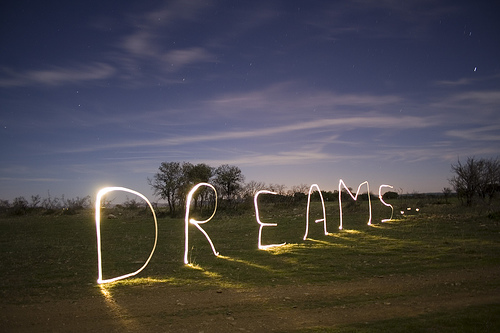Sex with an ex, a tooth that falls out, or missing the most important college exam of your life. These dreams are the one way that your self-consciousness can communicate to let you know exactly what is missing in your life. But are you listening? Dreams encompass several different theories, including scientific, spiritual, and psychological. The scientific theory explains dreams as a fundamental biological process consisting of brain waves, neurons, and memory pathways. The spiritual theory explains dreams as part of our spiritual soul, a means to help guide us on the right path. Not too far away from spiritual is a psychological theory, which sees dreams as a window to our subconscious. A way to understand ourselves is by reading into the symbolism of our dreams.
What is a Dream?
Dreams are part of the five stages of sleep we experience each night. The first stage begins with the onset of muscle relaxation, involuntary twitching, and the gradual move towards deeper sleep and distinct patterns of brain wave (delta) activity. The fifth stage, commonly known as REM (Rapid Eye Movement) sleep, is noted by its eye movement, paralysis of the body, and the formation of images, sound, and emotions within the mind’s eye (a.k.a. dreams). Paralysis is believed to be a safety mechanism for the overly active imagination. In other words, if you are dreaming of leaping off a cliff, there’s no danger of unconsciously using your bedroom window as a launching point to further the experience. This explains why when you try to run or punch within a dream, you can never get any momentum.
During REM sleep, some people awaken with what’s called sleep paralysis. This is when the sleeper is aware of what is going on but continues to be partially suspended in a REM-like dream state. Characteristic of stage five sleep, the body is paralyzed, but the eyes are wide open, looking around the bedroom, seeing a combination of both reality and hallucination. These hallucinations have been described as an alternative universe of demonic creatures crawling through walls and furniture. The experience can last a few seconds, up to several minutes. Sleep paralysis has also become a popular scientific explanation for the countless stories of people being visited by ghosts or abducted by alien spacecraft during the night.
Why Don’t We Remember Our Dreams?
Most of us have several dreams a night, but only a handful are ever recollected. The most widely accepted reason for this is that dreams were never designed to be remembered. If they were, when we would search through our memory banks to recall past events, we might become confused as to whether we were born in Ontario, or on the Starship Enterprise (Star Trek).
Symbolization in Dreams
Some experts believe dreams symbolize what is most important to us. This may include our fears, desires, conflicts, and fantasies, played out within a storyline that is designed to help us cope with life, find solutions, and guide us towards new and improved ideas. Many athletes, artists, and inventors have come up with their most innovative ideas while dreaming. Arnold Palmer worked out his signature golf grip, Paul McCartney created the melody to his hit song, Yesterday, and Stephen King outlined his bestselling thriller, Misery. Other experts say dreams are not purposeful, but rather byproducts of random, jumbled electrons firing in the brain (activation-synthesis theory), and the brain’s efforts to make sense of these.
Sigmund Freud made the first attempt to put dreams into logical understanding, and he did so by analyzing their symbolism (what he called “repressed longing”). For example, he believed that a train depicted in a dream symbolized the male appendage, while tunnels were a form of the female anatomy. Position a train going through a tunnel, and well, you get the picture of where Freud’s mind was half the time. But where science has made fun of such loose interpretations of dreams, many psychologists still believe dreams hold a deep, logical meaning behind their storylines.
Common Dreams Explained
In general, men and women have very different dreams. Women tend to have nightmares featuring snakes, bugs, and natural disasters, while men prefer the standard plethora of cars, sex, violence, and the occasional space alien, giving their dreams a healthy mix of Hollywood-style, adult entertainment. Women are more likely to dream about people they know (family, friends, co-workers), while men prefer their cast of characters to be strangers. This is probably why most women recall the co-stars in their dreams rather well, while most men can only vaguely describe hairstyles.
The most common dreams according to a Travelodge survey are being chased, teeth falling out, and being trapped/injured by an identifiable/unidentifiable foe. In addition, many people also dream about falling, flying, running late for an exam/test, and hanging out with a celebrity figure. Being chased in a dream is a symbol of running away from a problem (or being overworked). If your fleeing is successful, it symbolizes that everything is under control. If you are unable to run, or your feet are too heavy to move, you lack the ability to control the situation (most likely from low self-esteem, or you could just be experiencing paralysis).
Dream Spoiler:
In addition to the psychoanalytical explanation of one’s inability to walk/run in a dream, many researchers believe that this is merely our mind’s way of telling us that our body is paralyzed in our sleep. This theory also explains flying dreams, in that our brain is merely interpreting how it is we could be moving while lying stationary in our bed.
Loose teeth (teeth falling out) are another common dream symbolizing concerns about our appearance. When trapped in a dream, you are feeling confined (bored) by an aspect of your life (career, relationship, etc). If injured, your body is telling you to slow down and heal past emotional wounds. Falling in a dream symbolizes insecurity, and contrary to childhood myth, if you hit the ground while asleep, you will not die. Flying is a sign that your life is on a high note, and you are in complete control. Running late for an exam symbolizes the fear of not measuring up to people’s expectations or the fear of not being prepared for an upcoming challenge.
When a dream features a celebrity cameo, this is usually an idealized version of somebody you know, such as a friend or family member. According to GQ, everything that goes on around your face can also have some significant meaning. A trip to the barber for a haircut can signify the loss of control in your life, particularly a loss of power or appreciation at work or in someone’s life. If you notice that you suddenly have a beard, you could be hiding something or if the beard you normally have is gone or being shaved off, it could represent that you are going through a change in your life. The most interesting part is… sometimes these messages have not been consciously accepted, and it is by interpreting these dreams that you can come to terms with them.
Lucid Dreaming: Your Wildest Imagination Unleashed!
Lucid dreaming is a person’s ability to control their dreams. What would you think is the Canadian male’s most popular lucid dream? It does not involve a Bugatti, Jessica Alba, or a key position in the Canadian hockey league. The unanimous, universally preferred experience of all lucid dreamers is flying. Technology buffs like to talk about the wonders virtual reality will one day bring, but we already have this ability innately in our dreams. Imagine a handicapped war veteran dancing at a ball; an elderly, ex-professional baseball player playing ball with his old teammates; a teenager beating the tar out of a childhood monster (nightmare); or a heartbroken widower spending a day with her beloved. All these scenarios are possible in dreams if you only know how.
Only a very small percentage of the world population is able to control their dreams, and one of the most widely accepted techniques, developed by Dr. Stephen LaBerge of Stanford University, is called MILD (Mnemonic Induction of Lucid Dreams). While lying in your bed each night, tell yourself that you will remember your dreams, and will recognize them from reality. Think of a recent dream you’ve had, and place two important key points within the dream’s contents. One, a clear idea of what you want to dream about, and two, several cues (clues) placed around the environment to remind yourself it’s only a dream.
Once you master your dreams, according to Dr. LaBerge, you will also become the master of your awakened domain, because you will be able to consciously practice certain key moments in life (job interview, business speech, etc), before actually living them!
About Dr. Eric J. Leech
Eric has written for over a decade. Then one day he created Urbasm.com, a site for every guy.

